Related Research Articles
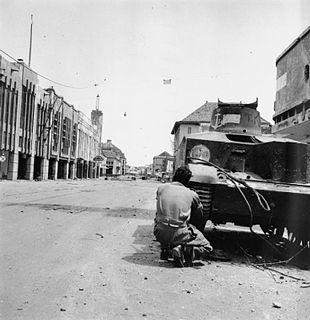
The Battle of Surabaya was fought between regular infantry and militia of the Indonesian nationalist movement and British and British Indian troops as a part of the Indonesian National Revolution against the re-imposition of Dutch colonial rule. The peak of the battle was in November 1945. The battle was the largest single battle of the revolution and became a national symbol of Indonesian resistance. Considered a heroic effort by Indonesians, the battle helped galvanise Indonesian and international support for Indonesian independence. 10 November is celebrated annually as Heroes' Day.
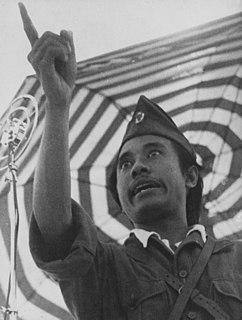
Sutomo, also known as Bung Tomo, is best known for his role as an Indonesian military leader during the Indonesian National Revolution against the Netherlands. He played a central role in Battle of Surabaya when the British attacked the city in October and November 1945.
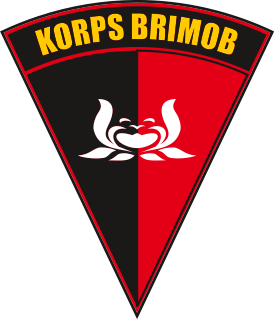
The Mobile Brigade Corps abbreviated Brimob is the special operations, paramilitary, and tactical unit of the Indonesian National Police (Polri). It is one of the oldest existing units within Polri. Some of its main duties are counter-terrorism, riot control, high-risk law enforcement where the use of firearms are present, search and rescue, hostage rescue, and bomb disposal operations. The Mobile Brigade Corps is a large component of the Indonesian National Police trained for counter-separatist and counter-insurgency duties, often in conjunction with military operations.

Tjoet Nja Meuthia, also known as Tjut Meutia, was an Indonesian national heroine.
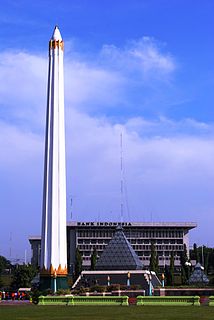
The Heroes Monument is a monument in Surabaya, East Java. It is the main symbol of the city, dedicated to the people who died during the Battle of Surabaya on 10 November 1945. The 10 November Museum is located under the monument.

Supriyadi, older spelling Soeprijadi full name Fransiskus Xaverius Soeprijadi, was an Indonesian national hero who rebelled against the occupying Japanese in 1945.

Abdurrahman Baswedan, also known as AR Baswedan was a nationalist, journalist, Indonesian freedom fighter, diplomat, and writer. During his political life, AR Baswedan was a member of the Central Advisory Council during the Japanese occupation of the Dutch East Indies and of the Investigating Committee for Preparatory Work for Independence (BPUPK), served as Deputy Minister of Information of the Third Sjahrir Cabinet, was a member of the Central Indonesian National Committee Working Group, a member of Parliament, and also a member of the Indonesian Constitutional Assembly. AR Baswedan was one of Indonesia's first diplomats who successfully gained de jure and de facto international recognition for the Republic of Indonesia. He was awarded the title of National Hero of Indonesia in 2018.

Siti Walidah, better known as Nyai Ahmad Dahlan, was a female emancipation figure, wife of Muhammadiyah founder Ahmad Dahlan, and National Hero of Indonesia.

Major General Professor Moestopo was an Indonesian dentist, freedom fighter, and educator. He was declared a National Hero of Indonesia on 10 November 2007.

Police-General Said Soekanto Tjokrodiatmodjo was the first Chief of the Indonesian National Police (Kapolri) and National Hero of Indonesia.

Air Commodore Iswahyudi was an Indonesian airman and National Hero. On 14 December 1947, the plane he was flying with Halim Perdanakusuma crashed off the coast of Tanjung Hantu Hill, Perak, Malayan Union. Halim's body was later found, but Iswahyudi's was never recovered.
National Hero of Indonesia is the highest-level title awarded in Indonesia. It is posthumously given by the Government of Indonesia for actions which are deemed to be heroic, defined as "actual deeds which can be remembered and exemplified for all time by other citizens" or "extraordinary service furthering the interests of the state and people". The Ministry of Social Affairs gives seven criteria which an individual must fulfill, as follows:
- Have been an Indonesian citizen who is deceased and, during his lifetime, led an armed struggle or produced a concept or product useful to the state;
- Have continued the struggle throughout his life and performed above and beyond the call of duty;
- Have had a wide-reaching impact through his actions;
- Have shown a high degree of nationalism;
- Have been of good moral standing and respectable character;
- Never surrendered to his enemies; and
- Never committed an act which taints his or her legacy.

Admiral Raden Eddy Martadinata was an Indonesian Navy admiral and diplomat. He was given the title of National Hero of Indonesia posthumously in 1966. He is recognized as one of the founders of the Indonesian Navy.
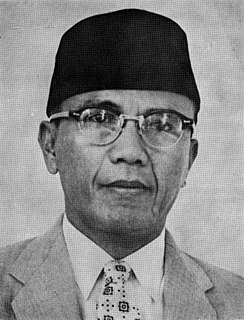
Nani Wartabone was an Indonesian politician and nationalist from Gorontalo. He was declared a National Hero of Indonesia by President Megawati Sukarnoputri on 6 November 2003. Wartabone became involved with social work as secretary of the Jong Gorontalo in Surabaya in 1923. Five years later, he became chairman of the Gorontalo branch of the Indonesian National Party (PNI). He declared "Indonesia's independence" on 23 January 1942, three years before the proclamation of Indonesian independence on 17 August 1945. After independence, he was part of the forces which ended the Permesta revolt of several army officers in 1958.

Andi Abdullah Bau Massepe was a Bugis-Indonesian nobleman who initiated attacks against Dutch forces during the National Revolution. He was the son of Andi Mappanyukki. On November 9, 2005, he was conferred the title of National Hero of Indonesia posthumously.
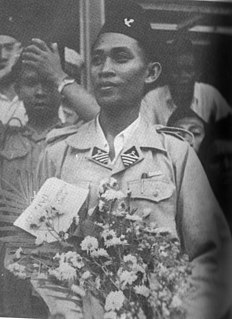
Hasan Basry was a military general, Indonesian nationalist leader, and was a key figure in the liberation of Kalimantan from Dutch rule. During the Indonesian National Revolution, he acted as the military representative of the Indonesian army in Kalimantan and led a guerilla war against the Linggadjati Agreement. He was a key figure behind the 17 May Proclamation which rallied Kalimantan natives against Dutch rule in 1949. He was declared a National Hero of Indonesia in 2001.
Harun Thohir or Harun Bin Said (1943–1968) was an Indonesian soldier born in Bawean Island, East Java, on 4 April 1943 to Mahdar and Aswiyani, while another source stated that he was born on 14 April 1943.

The 2018 Surabaya bombings were a series of terrorist attacks that initially occurred on 13 May 2018 in three churches in Surabaya, the second largest city in Indonesia and the capital of East Java province. The explosions occurred at Immaculate Saint Mary Catholic Church on Ngagel Madya Street; Indonesia Christian Church on Diponegoro Street; and Surabaya Central Pentecost Church on Arjuno Street. The first explosion took place at the SMTB Church; the second and third explosions followed within an hour.
Major General Muhammad Mangundiprojo was a 20th-century Indonesian soldier, revolutionary, and civil servant. Born in Sragen Regency on the island of Java, Mangundiprojo joined a nationalist group during the Second World War. He later fought against the return of Dutch colonial authority to Indonesia, and later went on to become a politician. He died in Bandar Lampung in 1988.

Abdul Fattah Jasin or Fatah Jasin was an Indonesian politician and Islamic cleric who served as Minister of Social Affairs during the Second Ali Sastroamidjojo Cabinet.